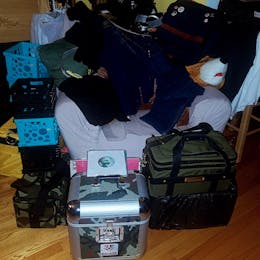
Kadhja Bonet- Childqueen (LP)
$19.00 USD
Please select all options.
Kadhja Bonet’s second album, Childqueen— now out on Fat Possum records— is something of a Hero’s Quest. In the opening Procession, above a muted drummer’s march, an unseen oracle announces to you, the listener: “every morning is a chance to renew, a chance to renew.” This is your first clue, setting you upon a path not to treasure, nor a grail, nor even a long lost love, but highest of all, what Kadhja has christened the “childqueen,” that innermost self that you were truthfully and instinctively before the press of the world came crushing in. As with her 2016 debut The Visitor, the songs on Childqueen are never casual, never ditties. Instead they invite us into a world not wholly our own, a half-mythical atmosphere where past and future meet in a parallel, yet faraway, present. Acting as a sort of diffuse chanteuse, Kadhja’s almost painfully lovely voice achieves what can only be described as ambient song. Particularly in songs like Delphine and Nostalgia, we hear the jazzier intricacies of the vocal melodies brushed soft at the edges, at times so soft they vaporize into pure mood, or merge with other instruments or with backing vocals that seem emanate from celestials bodies. And the instruments— played mostly by the polymathic Bonet herself— mix the cinematically and classically orchestral with the noticeably more synthetic. On tracks like Thoughts Around Tea or Another Time Lover, flutes, violins, guitars, drums, and bells share or trade the stage with acousmatic warbles, whooshes and lines, each gently couching the contours of the others. The result is a soundscape the listener sinks into, a sound that combines softer enchantments with an ever-listenable experimentalism, unplaceable in genre and decade from beginning to end.
Let customers speak for us
from 350 reviewsMy husband has been searching for this bag for the longest time, and he absolutely loves it! Thank you for the excellent customer service . If you haven't seen his video yet, check it out on his Instagram: @djkered. We truly appreciate it!

For the better part of a DECADE, I've been looking for a DJ bag that wouldn't fall apart at the stitching. Myriads of money spent, hunting for a bag that was as durable as it portrayed, while not looking like Bowser's shell hulking off of my back and concussing people from bumps on the train.
Funny enough to find that it's a hunt that a ton of DJs in my circle had gone through; all of us relegated to using whatever backpack might fit everything, hoping that the zippers lasted longer than their predecessors. This last spring, sitting down with some of that same cirlce, Tucker-Bloom got brought up by a DJ I admire; a recommendation packed up with the phrase "I have traveled across the country and around the world with it, and it hasn't flinched."
I was sold. I bought the bag while sitting at the breakfast table with all of them, and waited with hopeful anticipation that it'd match the praise it'd been given. I'm happy to say that it did all of that, so much more, and so *MUCH MORE* than I'd expected.
The folks at Tucker-Bloom had hit a snafu with materials for my bag, and reached out to let me know. They kept me abreast of changes and hang-ups throughout the entire process, which gave me such a peace of mind from the customer-side care alone that I figured that the bag HAD TO hit all the marks. The bag arrived damn near perfect..and fit EVERYTHING my gigantic "DJ lifestyle" bag held PLUS MORE.
I'd happily recommend this bag and Tucker-Bloom to any DJ that's looking for something that's not only well-made, but will last through travel, record packing, laptop safety, extras, and will still fit snacks + a book for the train.
Hats off, Tucker-Bloom.

Purchased on a whim and I don’t think I’ve ever been more comfortable in a tshirt. The fit and feel is exceptional. I’m 5’11”, 190lbs.

I love it. It is so deep. It can be a break out purse for my larger bag. It has been excellent for travel and I don't have to worry about ink stains or spills inside.

The tote arrived with superb quality and was given as a graduation gift. It makes a perfect gift for an occasion like graduation, because it has a multitude of uses and it's durable quality makes it evident that a graduate entering their career can use the tote forever.

I treated myself to the Transit Pass waist pack just in time for holiday travel. Not only does the nubbed leather smell even better than the picture on the screen. It feels comfortable and as snug or loose as you want to set it around your waist. ID & passport - check. Boarding pass on mobile phone - check. Hard candy - check. And you don't look like you're having a fanny. I actually wear mine on the front, a little to the side. Just like the medieval lady of the castle wore her keys to the pantry and to the women's chambers...

Very nice high quality back with very well thought out design essential for any self respecting vinyl collector who shares their talent publicly.

This sturdy sidekick goes with me eveywhere and keeps everything organized and within hand's reach. Zipper pocket holds way more than I imagined. On an average day it's filled with my wallet, smokes, keys, glasses, usb sticks and other random items. The two pockets arw great for things you reach for often. Mine usually has a lighter and my cell. I usually wear it across my chest but it also works like a money belt (or hip sack) around your waste which I've done on some travel days when discretion is advised. Quality is bullet proof. Another T&B sure shot.

I just absolutely love the bag. They accommodate my need of a faster shipping, just in time to take my vinyls to a gig. If you read this you should buy a bag. You’ll not regret it.

Lovely product, and is the exact specifications to pass a frontier airlines free carry on. 😆

incredible craftsmanship and design. sturdy as hell. thank you, A+ product!

The craftsmanship is impeccable and it looks sleek af 🔥 customer service experience is top tier 🙆🏽♂️ i hope they make more again in camo or brown, i missed out on the black. Thanks Case!




